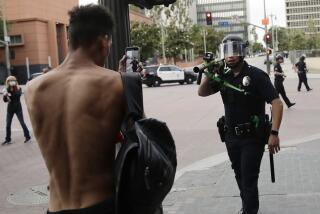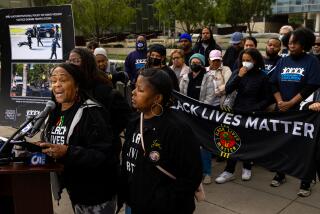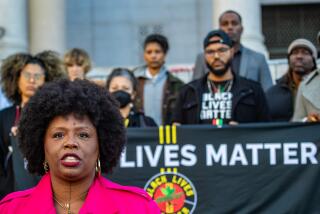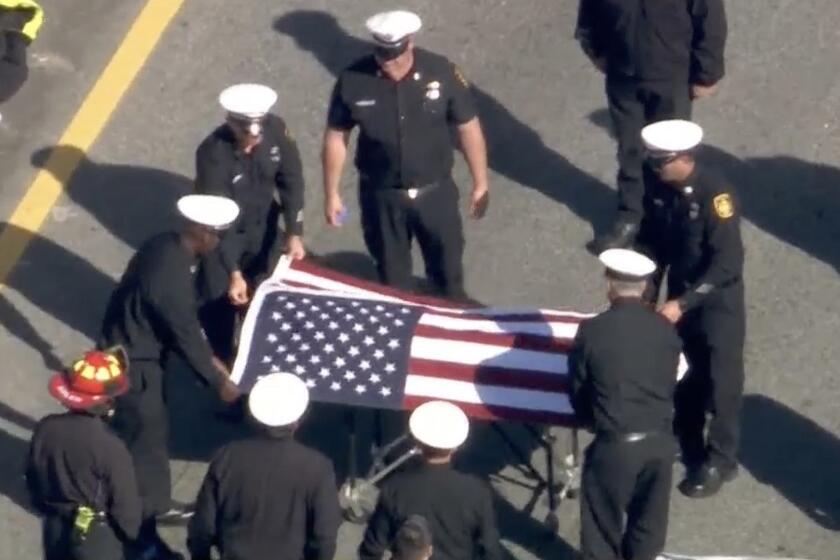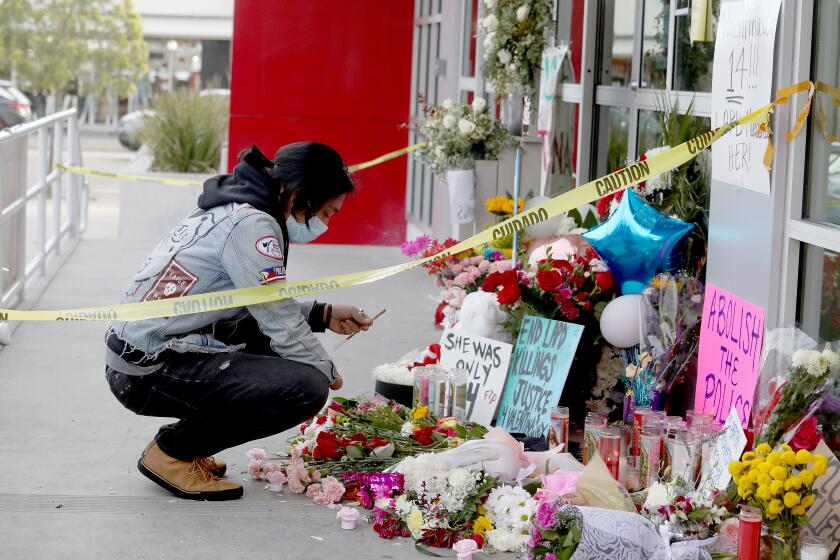L.A. calls restraining order on LAPD use of batons and projectiles ‘unwarranted’
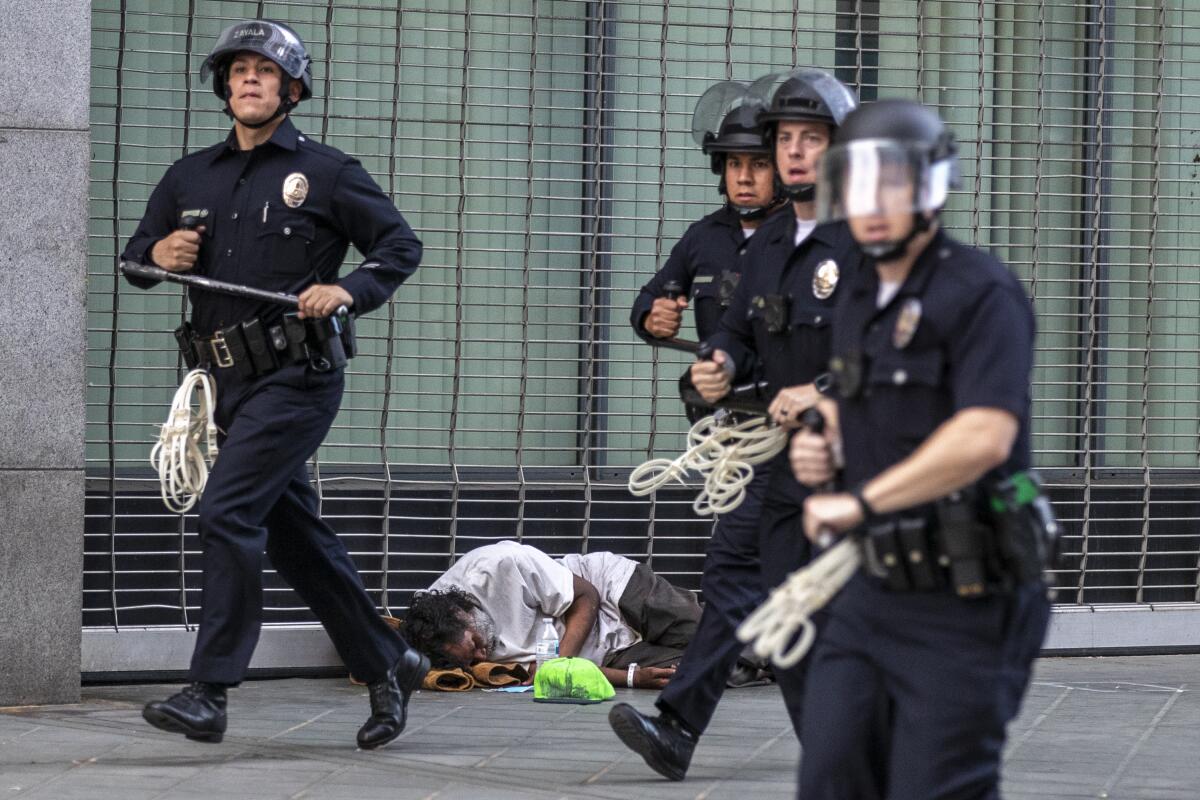
Attorneys for Los Angeles on Tuesday argued against a temporary restraining order to block city police officers from using batons and tactical bullets to control crowds, saying the request was “unwarranted and overbroad” and that police “must be able to respond” to unlawful crowds.
The Los Angeles Police Department used such weapons on protesters at the end of May and in early June, injuring many, and are now being sued for it in federal court by Black Lives Matter-Los Angeles, the local chapter of the National Lawyers Guild and the Los Angeles Community Action Network. The groups requested the restraining order last week, arguing that a court injunction against the use of such weapons was necessary for their clients and other protesters to feel safe exercising their 1st Amendment rights in the city while their lawsuit is pending.
Asst. City Atty. Gabriel Dermer, in response, said that was not the case, arguing that the LAPD has “facilitated numerous peaceful protests” without using such weapons since the incidents in question occurred and represents “no ongoing or actual threats of any kind” to protesters.
The city and the LAPD believe in the need for “transformative social change with respect to policing and institutional racism” and “support the constitutional right of every American to engage in peaceful demonstrations and protests,” Dermer wrote.
At the same time, there were “criminal acts of arson and looting” around the protests that “threatened public safety and are, of course, not protected First Amendment activities,” Dermer wrote, and the LAPD “must be able to respond to such situations.”
The LAPD is reviewing its officers’ response to the protests and their use of the weapons in question, Dermer wrote, but its policies surrounding those weapons should not be thrown aside in the meantime.
“The immediate wholesale elimination of several LAPD policies, without a more searching examination, is simply not warranted at this time,” he wrote.
The restraining order request is now before U.S. District Judge Conseulo Bland Marshall.
Tens of thousands of protesters have filled city streets in recent months to protest police killings of Black people, including George Floyd in Minneapolis. For several days at the end of May and early this month, Los Angeles was placed under a nightly curfew and police made thousands of arrests for curfew violations and for protesters failing to disperse from gatherings that the police had deemed unlawful. Some areas of the city suffered significant property damage.
A Times review found that officers injured many protesters with batons, sponge and foam projectiles and beanbags as they attempted to clear the streets. Some protesters suffered severe injuries to their heads and genitals. The class-action lawsuit against the city and LAPD Chief Michel Moore chronicles similar injuries in arguing that officers misused batons and projectiles.
Carol Sobel, an attorney for the plaintiffs, said the city’s response to their request for a restraining order relies on an assumption that crowds won’t gather again, even though the city has no control over that occurring and has seen large crowds gather time and again over many years.
The city also makes no promise that police won’t use the same tactics that injured protesters again and doesn’t address the fact that the department has used similar tactics repeatedly in the past, even after being admonished against doing so by previous courts.
“They’re not saying they wouldn’t do it again, and they’ve done it over and over,” Sobel said. “They still don’t have a plan — that’s really the problem here. And they have absolutely no way of predicting what is going to happen that might cause people to come back into the streets.”
Along with Dermer’s response, the city filed statements from several police officials, including Cmdr. Michael Rimkunas, who served at points during the protests as incident commander.
Rimkunas said the emergency injunction being sought is “completely unnecessary because the police conduct described” in the request “is not occurring today, has not occurred in the past three weeks and, based on crime trends, is not likely to recur.”
Cmdr. Ernest Eskridge, in his own statement, wrote that the department has 93 open investigations, including 74 that involve the use of force or are otherwise complicated and serious. Of those, 29 involve projectiles fired on May 29 and May 30, he wrote. Ten officers have been removed from the field pending investigations.
More to Read
Start your day right
Sign up for Essential California for news, features and recommendations from the L.A. Times and beyond in your inbox six days a week.
You may occasionally receive promotional content from the Los Angeles Times.
